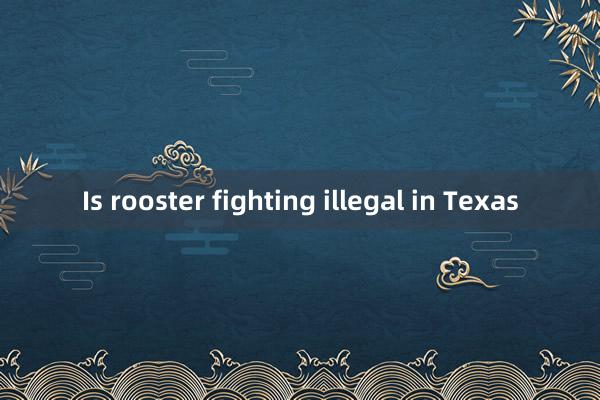Is rooster fighting illegal in Texas

Is Rooster Fighting Illegal in Texas?
Rooster fighting, often referred to as cockfighting, is a blood sport that involves two roosters fighting each other, typically until one is unable to continue. This practice has a long history in various cultures, but in many parts of the world, it has been outlawed due to concerns over animal cruelty. In the United States, the legal status of rooster fighting varies by state. This article explores whether rooster fighting is illegal in Texas, delving into the relevant laws and consequences associated with it.
The Legal Status of Rooster Fighting in Texas
In Texas, rooster fighting is indeed illegal. Cockfighting is banned under both federal and state law. The federal Animal Welfare Act (AWA) explicitly prohibits cockfighting and extends to all U.S. states, including Texas. On a state level, Texas has its own laws addressing animal cruelty, including specific regulations against cockfighting.
The Texas Penal Code Section 42.105 makes it illegal to participate in a cockfight in any capacity. This includes organizing, promoting, or attending a cockfight, as well as owning or training roosters for fighting purposes. The law is designed to eliminate all aspects of the activity, not just the act of fighting itself. Owning or possessing implements associated with cockfighting, such as blades or gaffs used to enhance the roosters’ fighting abilities, is also prohibited.
Violating these laws can result in severe penalties,chich69 including fines and imprisonment. Under Texas law, go88 tài xỉu participating in the promotion of a cockfight is considered a state jail felony, phim rule 34 which can lead to significant jail time. Simply attending a cockfight or possessing fighting roosters, even without participating in the fight itself, is a Class C misdemeanor, but repeated offenses can escalate to more serious charges.
The Role of Federal Law in Cockfighting Prohibitions
At the federal level, the AWA plays a significant role in curbing cockfighting activities across the United States. Initially passed in 1966, the AWA was expanded in the early 2000s to include stricter regulations on cockfighting. The law now prohibits cockfighting in all 50 states, including in U.S. territories such as Puerto Rico. Furthermore, it forbids the interstate transport of fighting roosters or any equipment associated with cockfighting, which effectively curtails the operation of cockfighting rings across state lines.
In 2019, the federal law was updated to prohibit cockfighting even in the U.S. territories, closing a loophole that allowed the activity to continue in certain regions. These changes have helped to make the U.S. one of the most restrictive countries when it comes to animal fighting, and Texas fully complies with these federal regulations.
go88 bị sậpWhy Is Cockfighting Illegal?
The primary reason for the illegality of cockfighting is concerns over animal cruelty. Cockfighting is inherently brutal, with roosters often suffering severe injuries or death as a result of the fight. The birds are often equipped with sharp blades or gaffs attached to their legs, making the fights even more dangerous and bloody. The suffering inflicted upon the animals has led to widespread condemnation from animal rights groups, veterinarians, and lawmakers.
Additionally, cockfighting has been linked to other illegal activities, including gambling, drug trafficking, and violence. Organized cockfighting rings often involve large sums of money being wagered, and the underground nature of these events can foster other forms of criminal behavior. Law enforcement agencies in Texas and other states frequently target cockfighting operations as part of broader efforts to crack down on organized crime.
Public Opinion and Enforcement in Texas
Public opinion in Texas largely aligns with the state's laws against cockfighting. Animal welfare groups in the state have been vocal in their opposition to the practice, and they work closely with law enforcement agencies to report and investigate cockfighting activities. Texas law enforcement has made numerous arrests in connection with cockfighting rings over the years, and authorities continue to monitor for illegal activities related to the sport.
Despite these efforts, there are still reports of cockfighting occurring in some rural areas of Texas. Enforcement can be challenging due to the clandestine nature of these events, which are often held in remote locations and involve a network of individuals who work to avoid detection. However, the penalties for those caught participating in or organizing cockfights are substantial enough to serve as a deterrent for many.
Conclusion
In summary, rooster fighting is illegal in Texas under both state and federal law. The Texas Penal Code and the federal Animal Welfare Act make it clear that all aspects of cockfighting are prohibited, including organizing, attending, and training roosters for fighting. The state’s laws are designed to prevent animal cruelty and combat the illegal activities often associated with cockfighting. While enforcement remains a challenge in some areas, the laws in place reflect a strong stance against this inhumane practice. Texans who engage in or support rooster fighting face severe legal consequences, and public opinion continues to move toward a more compassionate approach to animal welfare.
Jilino1 app downloadable contentwww.great-dating-services.com





